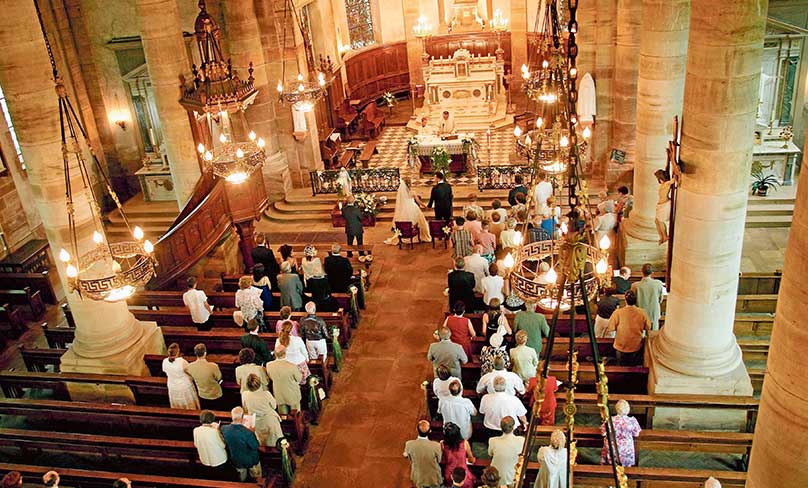
As I understand it, a number of the ecumenical Church councils dealt with specific heresies that were around at the time: the Council of Nicaea addressed the heresy of Arius, the first Council of Constantinople addressed Arianism, the Council of Ephesus took down Nestorianism and so on.
It wasn’t that the teaching expressed at each of these councils was only ever believed from that point; rather, it was something always believed, but the circumstances of the time required it to be expressed formally and with the authority of the Church.
I’ve been thinking about this as I’ve been reading the controversy surrounding the Anglican Synod held last month and, specifically, the furore relating to its defining marriage as “the union of a man and a woman for life to the exclusion of all others” as a formal part of the Anglican doctrine.
The move wasn’t an accident. It is required by the current circumstances that the Anglicans, and indeed all Christian churches, find themselves in.
As the full policy document for the Anglican Synod explains, religious freedom is currently protected by way of exemptions to anti-discrimination laws.
Religious bodies, the laws generally state, are permitted to do things that would otherwise be discriminatory if the action “conforms to the doctrines of that religion”. So, in the classic case of a same-sex couple looking to hire a church hall to host their wedding reception, a court or tribunal will need to assess whether a parish refusing to hire the venue “conforms to the doctrine of that religion” in order to determine if it fell within the exemption.
One would like to think that this would be a no-brainer, because the Christian understanding of marriage is clear, but the courts have shown recently that they will look for any opportunity to rule against the churches on this point.
A few years ago, the Victorian Supreme Court ruled that an organisation named Christian Youth Camps that was established by the Christian Brethren, required to operate in accordance with the fundamental beliefs and doctrines of the Christian Brethren and aimed at communicating the Christian faith by creating an “obviously Christian” atmosphere could not refuse a booking to a camp for gay teens. In the judgment, the court accepted the reasoning of an earlier tribunal decision that: “the absence of any reference to marriage, sexual relationships or homosexuality in the creeds or declarations of faith which Christians including the Christian Brethren are asked to affirm as a fundamental article of their faith demonstrates the Christian Brethren beliefs about marriage, sexual relationships or homosexuality are not fundamental doctrines of that religion.”
What this is basically saying is that unless we refer to marriage, sexual relationships or homosexuality in the creed, then we cannot claim it as a fundamental doctrine.
And what we have here are the courts trying to determine for religious bodies what are, and are not, fundamental items of their faith.
As I said last week, this is scary stuff. But the problem is not just coming from outside the Church.
The Church’s position is obviously not helped by dissident groups arguing (and even dissident clergy preaching) something other than the true meaning of marriage.
A court could point to a lay group, priest or Bishop advocating for the Church’s blessing of same-sex marriages, or even declaring that a Catholic in good conscience could have voted ‘yes’ in last year’s postal vote, as evidence that marriage between a man and a woman is not fundamental to the Church’s teaching.
It’s because of the challenges to the Church’s position on marriage coming from both inside and outside the Church that the Anglican Synod felt the need to make clear its teaching on marriage, and to formally define it as doctrine. They went on to say that church property must not be used for purposes which contravene the doctrines, tenets and beliefs of the church.
The restrictions aren’t limited to marriage. The Synod took the time to formally require that church property cannot be used for the promotion of non-Christian religions, for spiritual practices such as yoga, for the performance or advocacy of abortion or euthanasia, for activities that incite racial hatred or discrimination against the disabled, for the advocacy of gender ideology and more.
At a time when religious hospitals are under pressure to offer abortions, and where faith-based nursing homes overseas are being fined for not allowing euthanasia on their premises, these are important inclusions.
It is not a sad indictment on the Anglican church that its Synod had to formally define these matters.
Rather, it is a sad indictment on our current state of affairs that those within and outside the Anglican church no longer take it for granted that a Christian religion upholds the sanctity of life from conception to natural death, nor the fundamental nature of marriage between a man and a woman as key doctrines of their faith.
